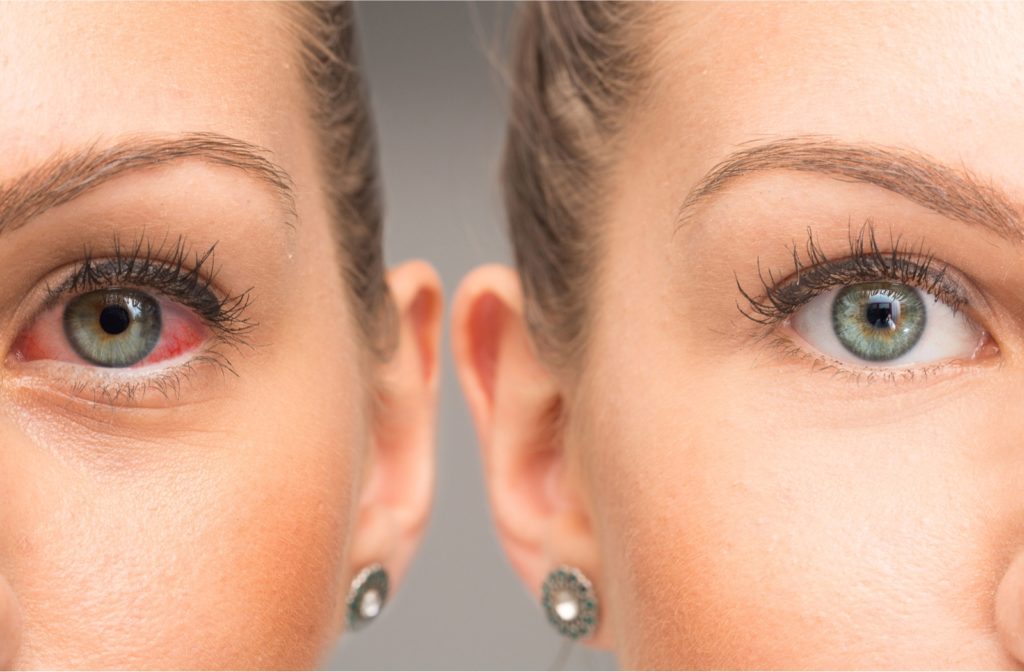Is It Allergies?
Eye irritation can be a symptom of many eye problems, but it can also indicate an allergic reaction. Patients familiar with their allergies can often tell if their symptoms are eye allergies. But an allergic reaction can look and feel similar to pink eye!
Knowing how to tell a seasonal irritation apart from an infectious condition can mean the difference between a routine eye examand emergency eye care. By getting to know the symptoms and treatment options, you can be better prepared the next time you experience red, itchy eyes.
So, how can you tell the difference between allergies and pink eye?
What Is Pink Eye?
Conjunctivitis (pink eye) is the name for any condition that causes swelling or inflammation of the conjunctiva. The conjunctiva is the transparent tissue layer covering the sclera (whites of your eyes) and the inner eyelids. It protects the front surface of your eye.
There are 3 types of conjunctivitis:
- Allergic
- Chemical
- Infectious
Depending on the cause and your eye health, pink eye can range from mild to severe. Most cases of conjunctivitis will not cause permanent eye damage. However, when it develops into a severe condition, it can affect eye health and sight when untreated.
Symptoms of pink eye can include:
- Burning or itchy eyes
- Discharge (sticky yellow, watery, or stringy)
- Eyelid swelling
- Excessive tearing
- Light sensitivity
- Pink (or red) whites of the eye(s)
Pink eye can be noninfectious (allergic or chemical) or infectious (bacterial or viral). All types of pink eye are spread or contracted through close contact with the eye—either direct eye-touching or the area around the eyes.
Infectious conjunctivitis is highly contagious. It can also be spread through coughing, sneezing, or touching a shared surface or object. Regularly washing your hands can help prevent transmission. Additionally, avoid touching your eyes or face before washing your hands! It’s a healthy practice for preventing any infectious eye conditions.
Allergic Pink Eye
While not all types of conjunctivitis (pink eye) are an allergic reaction, there is a condition called allergic pink eye! Allergic conjunctivitis occurs when allergens—such as pollen or mold spores—interact with your eyes.
As a type of pink eye, allergic pink eye shares many similar symptoms. Typically, symptoms can include:
- Burning eyes
- Itchy or irritated eyes
- Puffy eyes
- Redness (or pink eyes)
- Watery eyes
Unlike other forms of pink eye, you may also have additional allergy-related symptoms, such as:
- Asthma
- Nasal irritation (itchy or runny nose)
- Scratchy throat
- Sneezing
The symptoms typically affect both eyes when allergies are to blame for eye inflammation. However, with chemical or infectious conjunctivitis, it’s possible for only one eye to exhibit symptoms.

Allergies vs. Pink Eye: Treatment
Treatment for conjunctivitis depends on the type, how severe the symptoms are, and potential complications. Topical medication can help treat infectious pink eye, such as treating bacterial conjunctivitis with antibacterial eye drops or ointment.
Antibiotics cannot treat viral conjunctivitis. However, in many cases, viral pink eye can resolve on its own within 7 days. If the infection is severe, your optometrist may prescribe additional treatment, such as steroids. The medication can assist your natural immune system response and reduce the risk of eye damage, such as cornea scarring.
Allergic and chemical conjunctivitis is initially treated by removing the allergen or irritant. For example, if a perfume or cleaning spray causes eye irritation, moving away from the irritant and flushing your eyes can help resolve your symptoms. Symptoms won’t reoccur if you completely avoid the irritant.
Avoiding allergens can often be trickier than avoiding the irritants that cause chemical conjunctivitis. In some cases, avoiding an allergen isn’t practical. For example, when seasonal allergies are the problem, you might find relief in staying indoors. But, eventually, you’ll need to venture outside or open a window.
Allergic pink eye can also increase the risk of contracting or spreading eye infections, including infectious forms of conjunctivitis. You’re more tempted to touch your eyes, nose, or face while dealing with allergy symptoms, such as a runny nose or watery eyes.
Antihistamines can help improve symptoms by reducing histamines. When you experience an allergic reaction, your body produces histamines, chemicals responsible for removing allergens from your system.
While your symptoms are your body’s attempt to cleanse your body of allergens, the response can be overwhelming. Antihistamines work to make your immune response more comfortable.
If you have recurring allergies, you may have a prescription allergy medication or find over-the-counter allergy medication sufficient. Your optometrist may also prescribe antihistamine eye drops or artificial tears to reduce eye irritation.
Talk to Your Optometrist
It can be challenging to tell the difference between allergies and pink eye on your own, but your optometrist can help. Book an appointment when you experience eye symptoms, such as irritation or redness. Your optometrist can diagnose your eye health and recommend the appropriate treatment.
You can also help relieve eye symptoms by placing a clean cloth soaked in cold water over your eyes.
Receiving an accurate diagnosis is crucial for protecting your eye health. It can also help you find relief for eye allergies before symptoms start disrupting your life. Book an appointment with a Calgary eye doctor at the Calgary Optometry Centre today!




